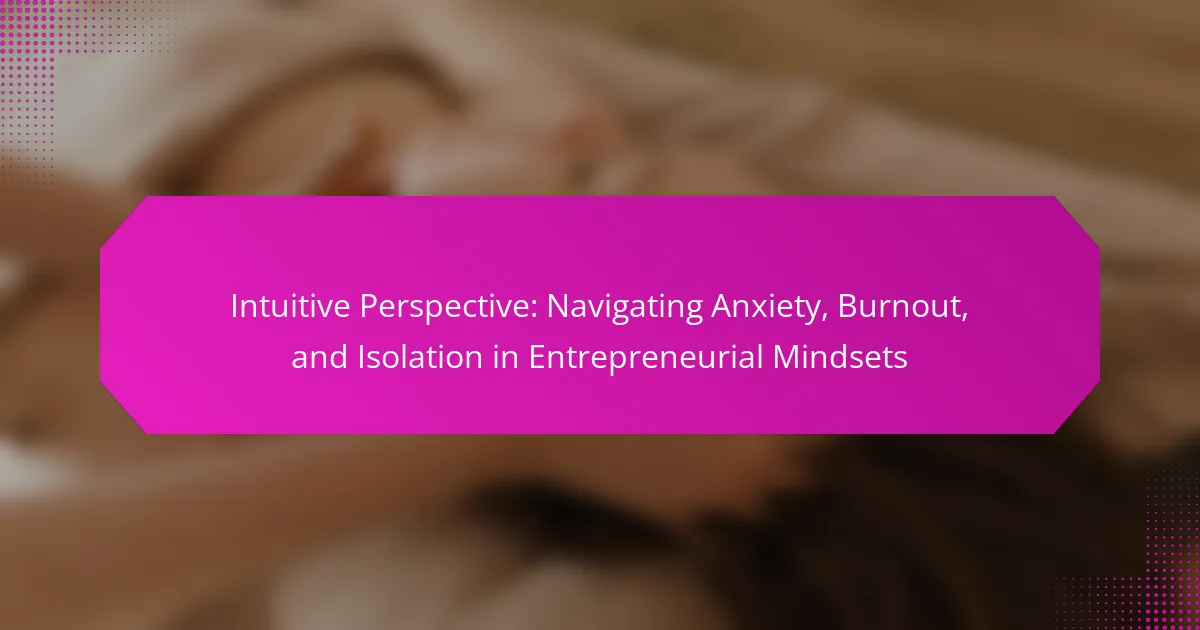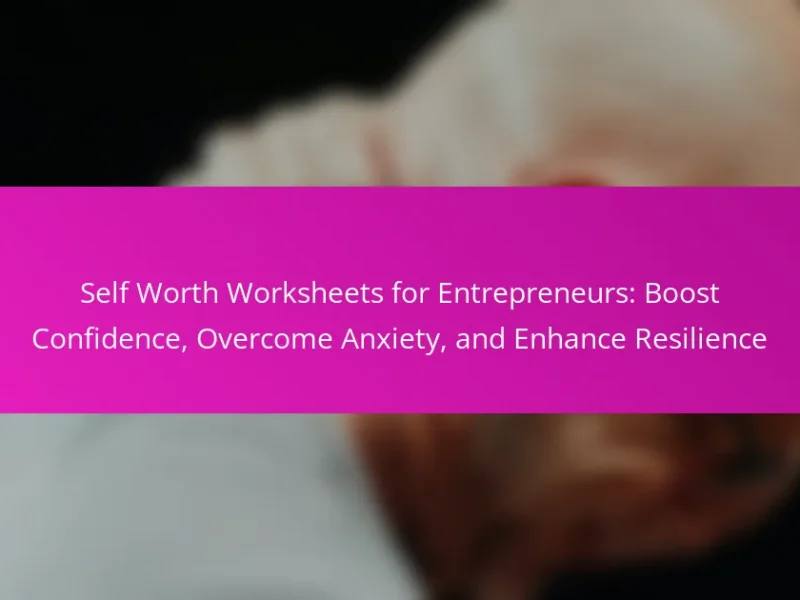Navigating anxiety, burnout, and isolation is crucial for maintaining a resilient entrepreneurial mindset. These mental health challenges hinder decision-making and creativity, leading to missed opportunities. Entrepreneurs must recognize the impact of high stress and the solitary nature of their work. Effective strategies, including mindfulness practices and building a support network, can help mitigate these issues and foster sustainable growth.
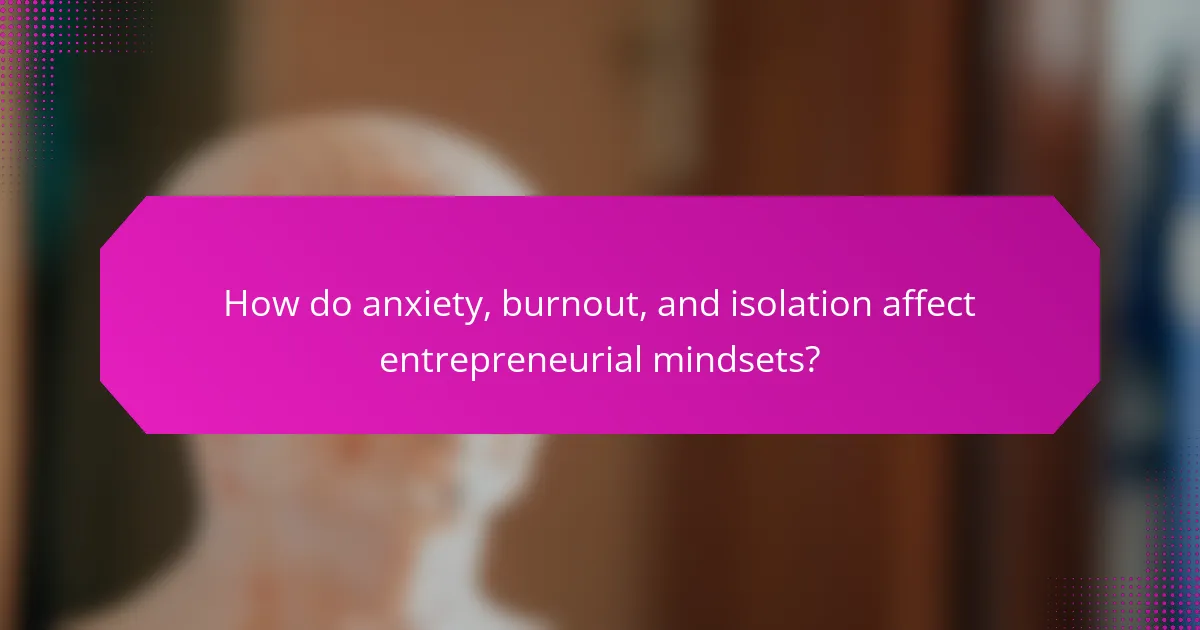
How do anxiety, burnout, and isolation affect entrepreneurial mindsets?
Anxiety, burnout, and isolation significantly hinder entrepreneurial mindsets by impairing decision-making and creativity. Entrepreneurs facing anxiety often struggle with risk assessment, leading to indecision. Burnout can diminish motivation and productivity, resulting in missed opportunities. Isolation exacerbates these effects, reducing access to support and collaboration. Collectively, these factors can lead to a negative feedback loop, stifling innovation and growth. Entrepreneurs must recognize these challenges and actively seek strategies to address them, such as mindfulness practices and peer networking, to maintain a resilient mindset.
What are the common symptoms of anxiety in entrepreneurs?
Common symptoms of anxiety in entrepreneurs include persistent worry, restlessness, fatigue, difficulty concentrating, irritability, and sleep disturbances. These symptoms can lead to burnout and feelings of isolation, impacting overall productivity and mental health. Entrepreneurs often face unique stressors, making awareness of these symptoms crucial for effective management. Identifying these signs early can help in seeking support and implementing coping strategies.
How does burnout manifest in business owners?
Burnout in business owners manifests as chronic fatigue, emotional exhaustion, and decreased productivity. It often leads to feelings of isolation and anxiety, significantly impacting mental health. Symptoms include irritability, lack of motivation, and difficulty concentrating. Recognizing these signs early is crucial for effective management and recovery.
What feelings of isolation do entrepreneurs experience?
Entrepreneurs often experience profound feelings of isolation due to high stress, relentless pressure, and lack of support. This emotional distance can lead to anxiety and burnout, impacting decision-making and overall well-being. Many entrepreneurs feel they must navigate challenges alone, creating a unique attribute of solitude in their journey. Recognizing these feelings is crucial for seeking connection and support, ultimately fostering resilience.

What universal challenges do entrepreneurs face regarding mental health?
Entrepreneurs face significant mental health challenges, including anxiety, burnout, and isolation. These issues stem from high stress levels and constant pressure to succeed. Anxiety often manifests as fear of failure, impacting decision-making. Burnout results from prolonged stress, leading to decreased productivity and motivation. Isolation can occur due to the demanding nature of entrepreneurship, creating feelings of loneliness. Addressing these challenges is crucial for maintaining mental well-being and ensuring sustainable business growth.
How does the pressure of decision-making impact mental well-being?
The pressure of decision-making can significantly hinder mental well-being, leading to anxiety and burnout. Entrepreneurs often face constant pressure to make critical choices, which can result in feelings of isolation. This stress can diminish cognitive function and emotional resilience, making it harder to cope with challenges. Research indicates that high-stakes decisions correlate with increased levels of anxiety, impacting overall mental health.
What role does work-life balance play in mental health for entrepreneurs?
Work-life balance plays a crucial role in mental health for entrepreneurs by reducing anxiety, preventing burnout, and combating isolation. Maintaining boundaries between work and personal life fosters emotional resilience. Research indicates that 60% of entrepreneurs experience significant stress, which can be mitigated through effective balance strategies. Prioritizing self-care and social connections enhances overall well-being and productivity.
How does financial stress contribute to anxiety and burnout?
Financial stress significantly contributes to anxiety and burnout by creating a cycle of worry and emotional exhaustion. Entrepreneurs often face constant financial pressures, leading to heightened anxiety levels. This stress can manifest as burnout, characterized by physical and emotional fatigue. Studies indicate that financial instability correlates with increased anxiety disorders, affecting decision-making and overall mental health. Addressing financial stress through effective budgeting and financial planning can mitigate these negative effects, promoting a healthier entrepreneurial mindset.

What unique factors exacerbate mental health challenges for entrepreneurs?
Entrepreneurs face unique mental health challenges due to high stress, isolation, and pressure to succeed. These factors can lead to anxiety and burnout, exacerbating their struggles. The relentless pursuit of goals often results in neglecting self-care, making it difficult to maintain a balanced mindset. Additionally, the lack of a support network can intensify feelings of loneliness and overwhelm. Understanding these unique factors is crucial for developing effective coping strategies and fostering resilience in entrepreneurial environments.
How does the fear of failure influence mental health?
The fear of failure significantly impacts mental health by increasing anxiety, leading to burnout and feelings of isolation. Entrepreneurs often experience intense pressure to succeed, which can result in chronic stress. This stress manifests as anxiety, making individuals more prone to negative thoughts and self-doubt. Consequently, the fear of not meeting expectations can lead to burnout, diminishing motivation and productivity. Additionally, isolation may occur as individuals withdraw from social interactions to avoid perceived judgment, further exacerbating mental health issues. Understanding these dynamics is crucial for developing supportive strategies in entrepreneurial environments.
What impact does the entrepreneurial culture have on mental well-being?
The entrepreneurial culture significantly impacts mental well-being by fostering anxiety, burnout, and feelings of isolation. Entrepreneurs often face high-pressure environments, leading to chronic stress. This stress can manifest as anxiety disorders, negatively affecting decision-making and overall health.
Additionally, the drive for success can result in burnout, characterized by emotional exhaustion and decreased motivation. A study found that around 30% of entrepreneurs experience burnout at some point in their careers. Isolation is another critical factor; entrepreneurs frequently work alone, which can lead to feelings of loneliness.
To mitigate these effects, cultivating a supportive network and prioritizing mental health initiatives are essential. Engaging in peer support groups can provide emotional relief and reduce isolation. Recognizing these challenges is vital for fostering a healthier entrepreneurial ecosystem.
How does the lack of support systems affect business owners?
The lack of support systems significantly heightens anxiety, burnout, and isolation among business owners. Without adequate support, entrepreneurs face overwhelming stress, leading to decreased productivity and mental health issues. Research shows that 72% of business owners experience anxiety, often exacerbated by isolation from peers. This isolation can stunt personal and professional growth, as collaboration and feedback are crucial for innovation. Additionally, the absence of mentorship or community leads to feelings of inadequacy and self-doubt, further impacting decision-making. Ultimately, a robust support system is essential for fostering resilience and maintaining a healthy entrepreneurial mindset.

What rare mental health challenges do entrepreneurs encounter?
Entrepreneurs often face rare mental health challenges such as heightened anxiety, chronic burnout, and profound isolation. These issues stem from the unique pressures of entrepreneurship, including financial uncertainty and the burden of decision-making. Anxiety can manifest as constant worry about business performance, while burnout results from relentless work without adequate rest. Isolation frequently occurs due to the solitary nature of entrepreneurship, leading to feelings of disconnection from peers. Addressing these challenges is crucial for maintaining mental well-being and sustaining business success.
How does imposter syndrome uniquely affect entrepreneurs?
Imposter syndrome uniquely affects entrepreneurs by intensifying feelings of self-doubt and inadequacy. This psychological phenomenon leads to increased anxiety, which can hinder decision-making and innovation. Entrepreneurs often experience burnout due to the relentless pursuit of success, feeling they must constantly prove their worth. Isolation is another significant impact, as entrepreneurs may struggle to share vulnerabilities, fearing judgment or disbelief from peers. These factors collectively create a challenging environment that can stifle growth and hinder overall well-being in entrepreneurial mindsets.
What are the long-term effects of chronic stress on entrepreneurs?
Chronic stress significantly impacts entrepreneurs, leading to anxiety, burnout, and isolation. Over time, these effects can reduce productivity and hinder decision-making. Entrepreneurs often experience prolonged fatigue, which diminishes their ability to innovate and adapt. This stress can also strain personal relationships, leading to social isolation. Research indicates that 72% of entrepreneurs report mental health issues, highlighting the need for effective stress management strategies.
How can sudden success lead to mental health issues?
Sudden success can trigger mental health issues such as anxiety, burnout, and isolation. Entrepreneurs often face intense pressure to maintain their newfound status, leading to chronic stress. This stress can manifest as anxiety, where fear of failure overshadows accomplishments. Burnout may occur as relentless work hours and high expectations drain energy and motivation. Lastly, isolation can stem from the feeling that others cannot relate to their experiences, creating a disconnect from friends and family. Recognizing these risks is crucial for maintaining mental well-being amidst rapid success.
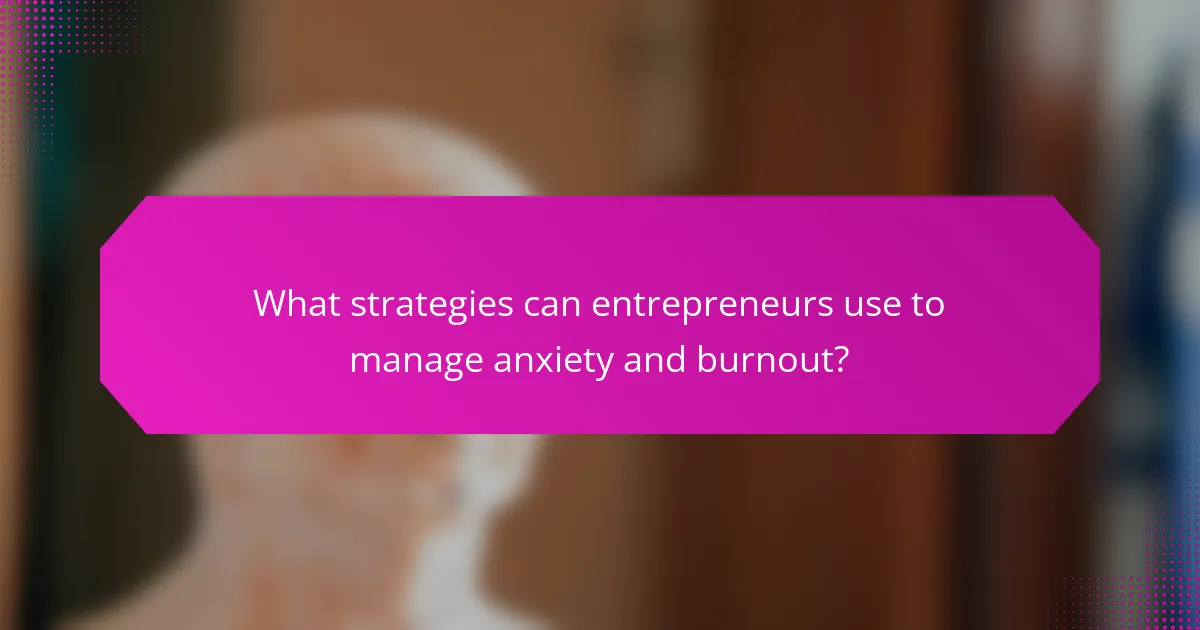
What strategies can entrepreneurs use to manage anxiety and burnout?
Entrepreneurs can manage anxiety and burnout through effective time management, mindfulness practices, and social support. Prioritizing tasks helps reduce overwhelm and enhances focus. Mindfulness techniques, such as meditation, foster emotional resilience. Engaging with peers or mentors provides vital support, combating feelings of isolation.
What practical steps can entrepreneurs take to reduce anxiety?
Entrepreneurs can reduce anxiety by implementing structured routines, practicing mindfulness, and seeking support from peers. Establishing a daily schedule creates predictability, which alleviates stress. Mindfulness techniques, such as meditation, enhance emotional regulation and focus. Connecting with fellow entrepreneurs fosters a sense of community, combating feelings of isolation.
How can business owners create a supportive work environment?
Creating a supportive work environment involves fostering open communication, promoting mental health resources, and encouraging work-life balance. Business owners should implement regular check-ins to understand employee needs. Providing access to mental health support can reduce anxiety and burnout. Additionally, flexible work arrangements can help employees manage their responsibilities effectively.
What coping mechanisms are effective for managing burnout?
Effective coping mechanisms for managing burnout include practicing mindfulness, setting boundaries, and prioritizing self-care. Mindfulness techniques, such as meditation, enhance awareness and reduce stress. Setting boundaries prevents overcommitment and fosters work-life balance. Prioritizing self-care, like regular exercise and adequate sleep, replenishes energy and improves resilience. These strategies collectively support emotional well-being in entrepreneurial settings.
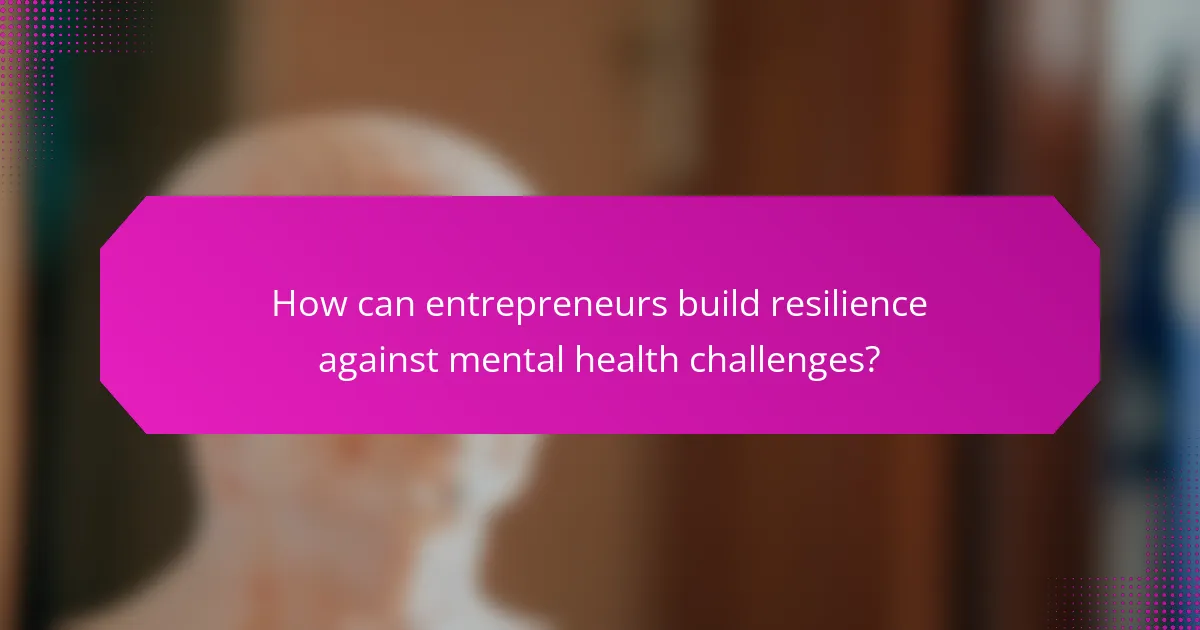
How can entrepreneurs build resilience against mental health challenges?
Entrepreneurs can build resilience against mental health challenges by adopting proactive strategies. Developing a strong support network fosters connection, reducing feelings of isolation. Mindfulness practices enhance self-awareness, helping to manage anxiety and burnout. Setting realistic goals prevents overwhelm, while regular physical activity boosts mood and energy levels. Engaging in continuous learning nurtures adaptability, a unique attribute essential for navigating entrepreneurial stressors.
What role does self-care play in maintaining mental health?
Self-care is essential for maintaining mental health, especially in navigating anxiety, burnout, and isolation. It enhances emotional resilience, enabling entrepreneurs to manage stress effectively. Regular self-care practices, such as mindfulness and physical activity, can significantly reduce symptoms of anxiety and improve overall well-being. Studies show that individuals who prioritize self-care report higher levels of productivity and creativity, crucial for entrepreneurial success. Engaging in self-care fosters a supportive environment, mitigating feelings of isolation and promoting connection with others.
How can entrepreneurs foster connections to combat isolation?
Entrepreneurs can combat isolation by actively seeking connections through networking, mentorship, and community engagement. Building relationships enhances emotional support and reduces feelings of loneliness.
Participating in industry events fosters valuable connections, expanding professional networks. Online platforms also facilitate interactions with like-minded individuals, creating a sense of belonging.
Mentorship offers guidance and encouragement, which can alleviate anxiety and burnout. Establishing a support system encourages sharing experiences and strategies for overcoming challenges.
Joining entrepreneurial groups or forums promotes collaboration and knowledge exchange, reinforcing community ties. These connections help entrepreneurs navigate their journeys more effectively, reducing isolation.
What expert insights can improve mental health for business owners?
To improve mental health for business owners, focus on developing resilience against anxiety, burnout, and isolation. Practicing mindfulness techniques can significantly reduce stress levels. Engaging in regular physical activity promotes emotional well-being and enhances productivity. Building a support network is crucial; connecting with fellow entrepreneurs fosters a sense of community. Setting realistic goals prevents overwhelm and maintains motivation. Lastly, seeking professional guidance when needed can provide valuable insights and coping strategies.
What are the best practices for mental health optimization in entrepreneurship?
To optimize mental health in entrepreneurship, prioritize self-care, establish support systems, and practice mindfulness. These strategies help mitigate anxiety, reduce burnout, and combat feelings of isolation.
Self-care involves regular physical activity, balanced nutrition, and sufficient sleep, which are essential for maintaining mental clarity and emotional resilience. Establishing a support system, including mentors and peer networks, fosters a sense of community and shared experience. Mindfulness practices, such as meditation and deep-breathing exercises, enhance emotional regulation and focus.
Balancing work-life boundaries is crucial. Entrepreneurs should schedule downtime and unplug from work to recharge. Setting realistic goals and celebrating small achievements can also promote a positive mindset. Regularly assessing mental health and seeking professional help when needed are fundamental practices for long-term well-being in the entrepreneurial journey.
What common mistakes should entrepreneurs avoid in managing mental health?
Entrepreneurs should avoid neglecting self-care, isolating themselves, and ignoring signs of burnout. Prioritizing mental health is essential for sustainable success.
Common mistakes include working excessively without breaks, failing to delegate tasks, and not seeking support from peers or professionals. These behaviors can exacerbate anxiety and lead to isolation.
Recognizing early signs of stress and implementing coping strategies can prevent mental health issues. Maintaining a balanced routine and fostering connections can enhance resilience.
Ultimately, addressing mental health proactively can improve decision-making and overall business performance.
